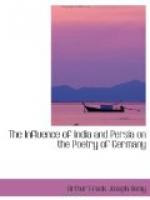[25] Piper, H.E. iii. pp. 531, 532. See also Hagen, Gesammtabenteuer, i. LXXXV and n. 2.
[26] Edited by Keller, Quedl. 1841. See art. by Goedeke in Orient und Occident, iii. 2. pp. 385 seq.
[27] See edition by Koschwitz, in Altfranz. Bibl., vol. ii. p. 7 seq., and consult Gaston Paris, La Poesie du Moyen Age, Paris, 1887, p. 119 seq.
[28] See ed. Adelb. von Keller, Stuttg. 1858 (BLVS. vol. 45), pp. 507 seq. Cf. also Uhland’s Koenig Karls Meerfart.
[29] Jiriczek, Die deutsche Heldensage, Leipz. 1897, pp. 144, 153.
[30] On this see Karl Bartsch, Herzog Ernst, Wien, 1869, Einl. p. cliii.
[31] Bartsch, op. cit. p. 204 seq. and p. 279 seq.
[32] See ed. Bartsch, Tueb. 1871 (BLVS. vol. 108), ll. 16749 seq.
[33] Piper, H.E. iii. p. 389.
[34] Piper, H.E. ii. p. 530 seq.
[35] See ed. by Heinr. Rueckert, Quedlinb. u. Leipz. 1858, l. 7141 seq. p. 189.
[36] Piper, Spielmannsdichtung, I. p. 215. See also ed. by Hagen u. Buesching in Ged. d. Mittel., Berl. 1808, i. l. 6.
[37] Piper, Wolfr. v. Eschenbach (KDNL, vol. 5), I. p. 214.
[38] See ed. v. Keller, Stuttg. 1858 (BLVS. vol. 44), ll. 24840, 24939, pp. 296, 298.
[39] Piper, H.E. iii. pp. 299, 300.
[40] Piper, H.E. ii. p. 325.
[41] Piper, Die geistliche Dichtung des Mittelalters (KDNL. vol. 3), ii. pp. 71, 72.
[42] See ed. Bartsch (KDNL. vol. 6), pp. 26, 27.
[43] Piper, H.E. ii. p. 222.
[44] See ed. Bartsch, l. 15067, p. 440.
[45] See ed. by Hagen in Ged. d. Mittel. i. p. 46, l. 4462 seq.
[46] Das Nibelungenlied, ed. Friedr. Zarncke, Leipz. 1894, p. 62, v. 3.
[47] Piper, Spielm., p. 30.
[48] Piper, Wolfr. v. Eschenbach, i. p. 208; cf. Dante’s Paradiso, cant. 29, ll. 100-102.
CHAPTER II.
FROM THE PORTUGUESE DISCOVERIES TO THE TIME OF SIR WILLIAM JONES.
Travels to India
and Persia—Olearius and his Work—Progress
of Persian Studies—Roger—India’s
Language and Literature remain
unknown—Oriental
Influence in German Literature.
Little can be said of Oriental influence on German poetry during the next three centuries after the Great Age of Discovery, and in an investigation like the one in hand, which confines itself to poetry only, this chapter might perhaps be omitted. Nevertheless a brief consideration of this influence on German literature in general during this period forms an appropriate transition to the time when the Oriental movement in Germany really began.
After the Portuguese had sailed around Africa, direct and uninterrupted communication with the far East was established. Portuguese, Dutch, French and English merchants appeared successively on the scene to get their share of the rich India commerce. German merchants also made a transitory effort. The firm of the Welsers in Augsburg sent two representatives who accompanied the expedition of Francisco d’ Almeida in 1505 and that of Tristao da Cunha in the following year. But conditions were not favorable and the attempt was not renewed.[49]




